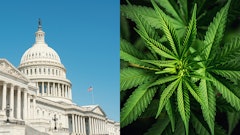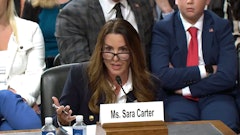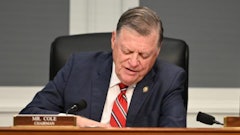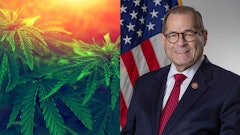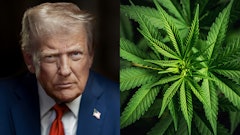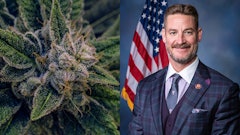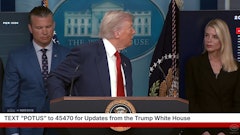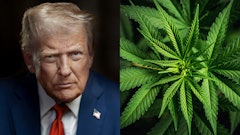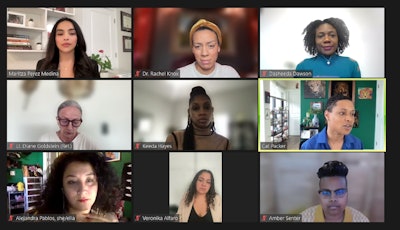
Cannabis advocates from the Drug Policy Alliance and other organizations and businesses organized a press briefing this week to explain why rescheduling cannabis falls short of President Joe Biden’s promises for reform and how it would continue to harm those most impacted by the criminalization of the plant.
Representatives from several organizations, including the Drug Policy Alliance, the Law Enforcement Action Partnership and the Cannabis Regulators of Color Coalition, were unified in their message that as long as the U.S. government continues to classify cannabis as a drug anywhere on the Controlled Substances Act (CSA), the disparities of cannabis criminalization would continue.
The Drug Enforcement Administration (DEA) is now reviewing the U.S. Department of Health and Human Services’ (HHS) recommendation to reclassify cannabis from a Schedule I substance – which are drugs seen as highly addictive and with no medical benefit – to Schedule III, which would put it alongside drugs like Tylenol with codeine. Many anticipate the DEA will follow the advice of HHS and reschedule the plant, the implications of which for state-legal programs, criminalization, regulation and more remain unclear.
“Rescheduling marijuana without further action would fail to deliver on President Biden's promises to Black and Brown communities and risks leaving the very individuals in communities that have borne the brunt of cannabis criminalization behind,” said Cat Packer, director of drug markets and legal regulation for the Drug Policy Alliance, during the press briefing Feb. 28, a recording of which is available on YouTube. “If President Biden and his administration believed that marijuana reform is a racial equity issue and that criminalization has failed, its agency should be proactively engaged in acknowledging and addressing the racist origins of marijuana criminalization and the resulting harms in racial disparities.”
Packer quoted Vice President Kamala Harris, who has said that cannabis reform and policies should not be incremental.
“She was right, and yet rescheduling marijuana to Schedule III, the outcome that is anticipated to result from the Biden administration's actions would continue the very criminalization that Biden said that he would end and is the very type of incrementalism that Vice President Harris criticized in 2020,” Packer said.
Dasheeda Dawson, chair of the Cannabis Regulators of Color Coalition and founding director of Cannabis NYC, said that descheduling is the best way to move forward for true reform, and to “pave the way for a fair and inclusive future.”
“Descheduling marijuana is not merely a matter of legality, it is a moral imperative. By removing cannabis from the confines of federal scheduling, we can dismantle the barriers that have hindered our efforts to repair and restore the lives of those most harmed by outdated draconian policies,” Dawson said. “Deschedule, or do nothing.”
A dozen U.S. senators have also pushed for descheduling, not rescheduling, and sent a letter to DEA Administrator Anne Milgram and Attorney General Merrick Garland in January urging them to remove cannabis from the CSA. They also requested Milgram and Garland answer six questions about the rescheduling process for transparency, including, "Specifically, how (if at all) would the criminal enforcement of marijuana by the DEA change if marijuana were moved to another schedule in the CSA? Please provide an answer for Schedule II, Schedule III, Schedule IV, and Schedule V."
RELATED: 12 US Senators Say Cannabis Should Be Descheduled, Demand Transparency From DEA
The senators are still waiting for a response.
"Contrary to popular belief, rescheduling to Schedule III would not increase access to medical cannabis or pave the way for nationwide decriminalization," Dawson said. "Instead, it would further entrench bureaucratic barriers, limit research and access opportunities to channels that are already historically excluding Black and Brown communities and ultimately impede the local, the state, and local development of the robust and inclusive cannabis industry that we are trying to build."
Dr. Rachel Knox, MD, board chair for the Association for Cannabis Health Equity and Medicine, said because Schedule III substances are typically required to receive Food and Drug Administration (FDA) approval, she's concerned that rescheduling could limit access, not expand it.
"Schedule III will not serve these patients absent state access, whether that's a medical only program or adult use, [and] would subject patients to the FDA's lengthy approval process for what would likely amount to a limited number of isolated compounds rather than the whole plant preparations," Knox said. "Sensible reform must deschedule cannabis in favor of regulating commercial production to ensure safety and efficacy while maintaining patient access to affordable, traditional options."
Knox also noted how, in its recent recommendation to reschedule cannabis, HHS did not address its own implicit bias in examining cannabis, which has long been demonized and stigmatized because of government policies.
"They failed to examine how scheduling has skewed the very data they use to analyze and inform their recommendation. And furthermore, and most importantly, they did not weigh the public health impacts of prohibition against the risks of legal access as a function of the Controlled Substances Act," Knox said. "The enforcement of cannabis prohibition has fueled intergenerational poverty and worsening health disparities in Black and Brown communities to this day. Scheduled cannabis is in and of itself a public health issue."
Amber Senter, co-founder, board chair and executive director of Supernova Women, spoke about the tax burden for cannabis operators, and how it not only hinders profitability, but can fuel the unregulated, unlicensed market where prices tend to be lower. While federal tax reform is critical, she said there must be more done to support small business owners to foster an inclusive and dynamic industry.
"Although the industry at large is advocating for a federal tax break, such an adjustment must go hand in hand with safeguards against corporate monopolies. Without these measures, the anticipated cannabis rescheduling could trigger a corporate takeover, edging out small businesses, specifically the elimination of the punitive 280E tax code," Senter said, referring to the tax code that prevents many plant-touching cannabis companies from taking normal business deductions. "For a small business accruing $500,000 annually, a $150,000 savings, about 30% from the 280E tax removal, is substantial, allowing reinvestment and growth and workforce development. Conversely, for big players, this 30% savings becomes a monumental advantage, giving them disproportionate leverage to dominate the industry."
Senter also said that as an honorably discharged, Black veteran, she cannot access Small Business Administration resources and other federal business programs, which may continue if cannabis is merely rescheduled instead of descheduled.
Veronika Alfaro, CEO of Mi Sota Essence, a Latina-owned cannabis company in Minnesota, said although cannabis is now legal for adult use in 24 states, not everyone has the opportunity to participate in the industry.
"This is true in particular for immigrants and non-citizens, including people who are legal, permanent residents and hold green cards," Alfaro said. "... Due to marijuana placement on the CSA, immigration laws still treat marijuana activity as a crime. This includes employment or investment in the legal cannabis industry. My own family who are law abiding, tax paying, lawful permanent residents cannot invest into my company because this could harm them. They cannot even work in my business due to their immigration status."
Alejandra Pablos, organizer and advocate, said that she's been fighting her own deportation case, which was "the direct result of the war on drugs." If cannabis is rescheduled, Pablos said, immigrant communities could still face detention and deportation because immigration is governed by federal law.
"The president has said before no one should be in jail just for using or possessing marijuana. Well, no one should be deported either," Pablos said.
Keeda Haynes, federal policy analyst with the National Council for Incarcerated and Formerly Incarcerated Women and Girls and former public defender, shared her story of how she was sentenced to seven years in federal prison for a cannabis-related offense.
"After several years of appeals, I served almost four years before I was released in 2006. So like so many others on this call, this issue is very important to me," Haynes said, noting that many people are still incarcerated for cannabis-related offenses and the disparity of how laws are and have been applied. "President Biden, at a campaign stop in South Carolina, made an erroneous statement when he said, 'I [kept] my promises when I said no one—no one should be in prison for merely possessing marijuana or using it, and their records should be expunged.' Again, I agree with him as well. However, it should be noted that not a single person has been released from prison because of a pardon by President Biden."
Lt. Diane Goldstein, executive director for the Law Enforcement Action Partnership and a retired law enforcement official, shared statistics about the number of arrests made for simple cannabis possession since 2011 because cannabis was "wrongly classified under Schedule I."
"An astounding 60.5 percent of all arrests in the U.S. since 2011 were for simple possession of cannabis," Goldstein said. "We know from firsthand experiences as policing professionals that rescheduling will not end criminalization at the federal level.
"Descheduling provides us with an opportunity for the federal government to lead through the enactment of important social justice provisions that include post-conviction relief measures for those convicted of cannabis-related offenses, and a pathway for expungement and pardons of federal marijuana charges, which continue to lead to discrimination in employment, housing, and other services. It's crucial to avoid maintaining the failed and damaged marijuana enforcement policies of the past."
A recording of the press briefing is available on YouTube.















